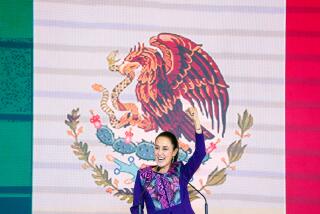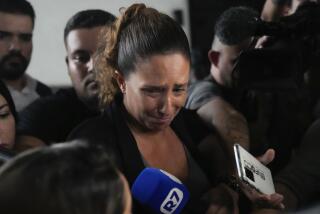In Macho Brazil--Two Women Mayors
- Share via
RIO DE JANEIRO — The first two women in Brazil’s political history have been elected mayors of state capitals as part of a rising tide of political participation by women in the country’s new era of democracy.
The two were among 201 mayors elected last week, when 16 million Brazilians went to the polls. Both victories were upsets that surprised the male political establishment.
Maria Luiza Fontenele, a 43-year-old teacher, who had earlier won a seat in the state legislature, took the mayoral post in Fortaleza, capital of Ceara state.
She ran as the candidate of the small, relatively new Workers Party, which is backed by “progressive” sectors of the Roman Catholic Church. It is the first time that this party, which appeals to students, organized labor and peasant unions, has won control of a major city.
Gardenia Goncalves, 45, wife of a state senator in Maranhao, the home state of President Jose Sarney, defeated a male candidate for whom Sarney campaigned. She was elected mayor of Sao Luiz, the state capital.
“Something is beginning to change in women’s political participation in Brazil,” said Marta Suplicy, a sociologist in Sao Paulo, whose husband, Eduardo Suplicy, finished third in the race for mayor of Brazil’s biggest city.
“In Fortaleza, Maria Luiza won in the most macho, patriarchal state in the country,” Suplicy said. “She showed that women can beat the old political colonels when they organize.”
Goncalves’ victory, while coming as a surprise, was in the tradition of Brazilian women politicians who have risen to the top because of their association with male political leaders. Her husband has an established following in Maranhao, where he has been a longtime opponent of Sarney.
“But Maria Luiza made it on her own without the help of any male politician,” Suplicy said.
In both cases, however, the women conducted vigorous campaigns, greeting voters, shaking hands and delivering spirited speeches at public rallies. They also both showed that they are good party organizers.
In all 25 state capitals where mayors were elected, the number of women registered to vote (7.5 million) was slightly larger than the male electorate (7.4 million). All the male candidates depended on women’s votes and, in some cases, made a direct appeal for women’s support.
But, in Brazil’s traditionally male-dominated society, there were only nine women candidates in the contests for mayors of state capitals. This was less than 2% of the total number of candidates.
In the Brazilian Congress, which has 435 deputies and 69 senators, there is one woman senator and seven women deputies. Women obtained the right to vote in Brazil in 1932, but only recently have they moved on to play a role as candidates for national and state office.
“Maria Luiza’s example should serve as an inspiration for women to raise the level of political representation in the next elections for Congress, which will also be an assembly to reform the constitution,” Suplicy said.
That congressional balloting will be held a year from now. At the same time, voters will elect governors in all of Brazil’s states and, for the first time, will choose members of Congress from Brasilia, the federal capital.
Self-Made Success
Fontenele, who carried her campaign into the slums surrounding Fortaleza, a city of 1.5 million people, is a self-made political leader.
She was born to a tenant-farmer family in Quizada, one of the impoverished towns of the interior of Ceara, where searing droughts often drive peasants off the land. She went to a Roman Catholic school and later studied social service at the state university.
After working as schoolteacher, she obtained a scholarship to Vanderbilt University in Nashville, Tenn., where she received a master’s degree in sociology. She returned to Ceara and taught at the university there.
More to Read
Sign up for Essential California
The most important California stories and recommendations in your inbox every morning.
You may occasionally receive promotional content from the Los Angeles Times.










